第58回公共政策セミナー
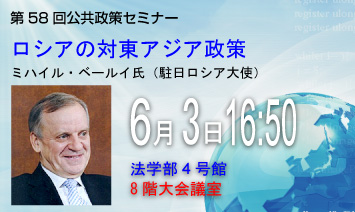
「ロシアの対東アジア政策」
“Russia's Policy towards East Asia”
ミハイル・ベールイ氏(駐日ロシア大使)
| 日 時 : | 2010年6月3日(木) 16:50~18:30 |
|---|---|
| 会 場 : | 東京大学本郷キャンパス 法学部4号館8階大会議室 |
| 司 会 : | 飯村豊(公共政策大学院教授) |
| 言 語 : | 英語 |
6月3日(木)法学部4号館において、ミハイル・ベールイ駐日ロシア大使による第58回公共政策セミナーが開催されました。
約60名の参加があり、『ロシアの対東アジア政策』というテーマについて、活発な議論がなされました。
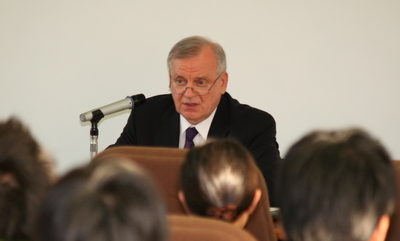
ミハイル・ベールイ駐日ロシア大使
Summary
The incumbent Russian ambassador to Japan focussed his speech on the obstacles associated with efforts to form an integrated, stable and peaceful East Asia region; with emphasis on the role of the prominent regional players and Russia's role in facilitating regional objectives. This was supported with an overview of Russian foreign policy in the region where special attention was placed on the long standing Russia-Japan relationship.
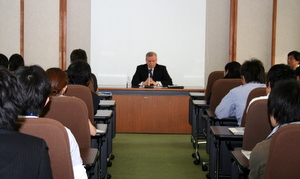
Although at the beginning of his speech the Ambassador recognised that negative images of Russia were still prevalent in the region, he was glad that interest in Russia has been increasing of late. He also recognised the legacy of pre and post World War Two issues such as the weakness of international treaties that provide frameworks regulating broader military, political, and economic issues; low levels of inter-regional trust; insufficient development of security mechanisms; and the still prevalent interstate territorial and diplomatic conflicts as the major obstacles to overcome in order to facilitate regional objectives.
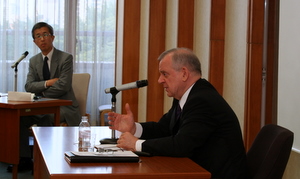
Taking the above obstacles into consideration and also the multifaceted nature of the region which has a diverse range of religions and cultures, the ambassador outlined regional objectives; to create a cooperative environment where the main issues of political and economic integration, security, humanitarian and legal issues, territorial disputes, and such transborder phenomena as the narcotics trade, terrorism, energy security and economic crises can be dealt with. APEC, he states, along with continued economic integration through bilateral and multilateral treaties and network diplomacy, is destined to be the instrument that facilitates these goals. He cites an arms race and North Korea as two of the liabilities which have the potential to destabilise the region.
Whilst accepting that “we are all in the same boat” due to the ever increasing globalised nature of world affairs, Ambassador Mikhailovich clarified Russia's role in the region and its foreign policy. Through strong cooperation with the major regional and world players, he insists that Russia's is a policy of non-intervention into the affair other states. Furthermore, that as an Asian Pacific state Russia will constructively contribute to region wide efforts in order to create friendly and cooperative relations through multilateral structures and regional integration processes.
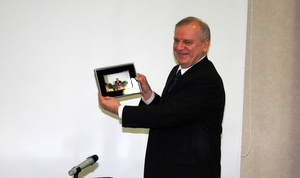
In finishing his speech the Ambassador drew attention to the Russia-Japan relationship. He stated that the two countries have much in common, such as a mutual commitment to the same fundamental values; opposing threats to regional stability, the non-proliferation of WMDs, the settlement of wider regional problems (including issues related to Korean peninsula), economic cooperation and traditional cooperation in the arts and literature. Welcoming renewed economic cooperation between the countries in the form of increased FDI and infrastructure and energy projects, the Ambassador emphasised Russia's role as a logistics hub and basically stated that Russia's role in the coming future would be one of a facilitator of joint-cooperation and peace and stable in the region.
Questions were fielded after the initial speech by enthusiastic participants.
